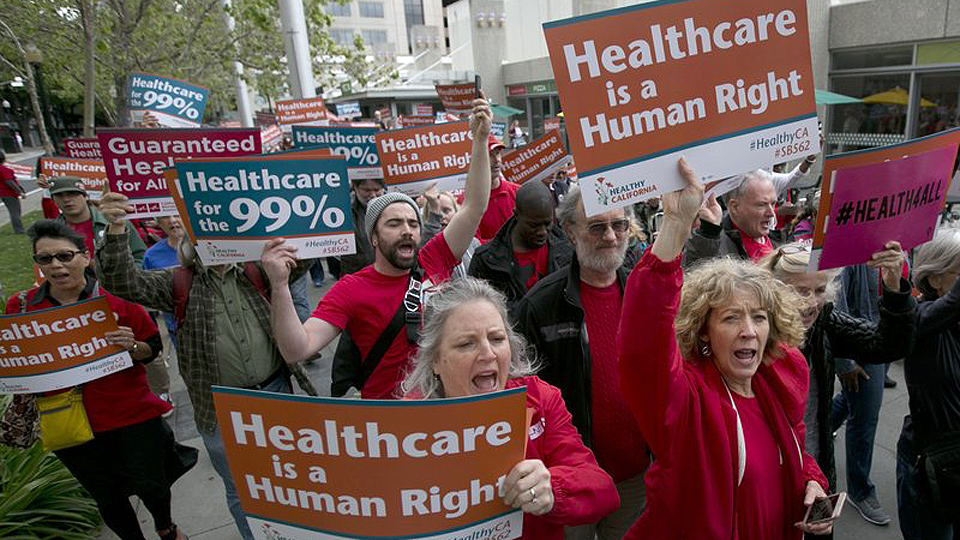
WASHINGTON—More unions are endorsing single-payer government-run health care, a sign the issue resonates with leaders—and with predominantly Democratic voters among unionists.
At the same time, more outside organizations, led by the giant American Association for Retired Persons (AARP), are joining the cavalcade of protests and lobbying against the latest last-ditch Republican scheme to destroy the Affordable Care Act, and to throw millions of people out of health insurance. A bipartisan coalition of governors has also signed a letter against the ACA repeal.
The moves came as the GOP-run Senate nears a showdown on that measure, introduced the same day, Sept. 13, as single-payer. In their plan, GOP Sens. Lindsay Graham (S.C.), Bill Cassidy (La.), Dean Heller (Nev.), and Ron Johnson (Wis.) would convert most federal health programs into a block grant to states starting in 2020.
Their legislation would let the states choose who to cover, how much to cover, and whether they could discriminate against women, minorities, and people with pre-existing conditions. It faces a Sept. 30 deadline for a vote, under arcane Senate rules that allow the GOP to jam it through with only 50 votes, plus Vice President Mike Pence as a tie-breaker.
By contrast, single-payer Medicare for All, championed by Sen. Bernie Sanders, Ind-Vt., (S1804) and Rep. John Conyers, D-Mich., (HR676) would include everyone—and everything. And the feds would set the payments to doctors and insurers to cover particular procedures, illnesses, medications, and treatment.
That’s attractive to the unions that joined the single-payer caravan—so much so that a coalition of unionists for single-payer is telling the AFL-CIO to act quickly on proposed resolutions so that the federation is on record for the cause. There’s a Sept. 22 deadline to submit formal resolutions for AFL-CIO endorsement at its convention exactly a month afterwards.
Mark Dudzic, of the Labor Campaign for Single Payer, reported that, as might be expected, National Nurses United (NNU) led the way. NNU members were a large share of the standing-room only crowd in the large Senate committee room where Sanders unveiled his latest single-payer bill. The union has championed that cause for years.
“We speak our patients’ name, we can’t forget their faces, and we will never stop fighting until they have guaranteed access to healthcare as a human right,” said NNU’s Bonnie Castillo in a statement circulated by the Labor Campaign.
Other support came from the Utility Workers, the Professional and Technical Employees, the Postal Workers, the Amalgamated Transit Union, the Brotherhood of Maintenance of the Way Employees/Teamsters, the Civil Service Employees Association, the United Electrical Workers and the Mine Workers, Dudzic said.
Of that group, ATU and UE previously supported single-payer. The Steelworkers also are longtime champions and reiterated their support in a statement on their website.
Utility Workers President Mike Langford compared fixing health care with single-payer to fixing disasters “safely and efficiently when provided the right tools.” Professional and Technical Employees President Greg Junemann said single-payer means “Americans would receive the care their doctors prescribe, rather than the reduced or withheld care allowed by insurance companies… Americans should not be squeezed beneath the thumb of multi-billion-dollar insurance companies who profit by withholding medical care.”
Meanwhile, House Minority Whip Steny Hoyer, D-Md., compiled excerpts of statements by various health care-oriented groups, all opposing the Graham-Cassidy GOP legislation. AARP, which has millions of members, and the American Medical Association (AMA), which represents most U.S. doctors, are the two most influential.
“Older Americans care deeply about access to and affordability of health care. They need and deserve affordable premiums, lower out-of-pocket costs, and coverage they can count on as they age. The Graham/Cassidy/Heller/Johnson bill would do precisely the opposite. Overall, the bill would increase health care costs for older Americans with an age tax, decrease coverage, and undermine preexisting condition protections,” ARRP said in part.
It also said their bill could drive older people out of their homes and into nursing homes and then “threaten coverage for individuals in nursing homes.”
The AMA not only opposed the GOP legislation, but “any other legislative efforts that would jeopardize health insurance coverage for tens of millions of Americans.” And the American Nurses Association added the GOP bill “is not substantially different from any of the other repeal and replace bills we have seen from House and Senate Republicans.”












Comments